Ladakh, in northern India, is a high-altitude desert region known for its stunning landscapes, including rugged mountains, deep valleys, and crystal-clear lakes. It also draws a number of adventure seekers because of trekking, climbing, and even rafting. The historical influence of Buddhism in the region can be seen in old monasteries like Hemis, Thiksey, and others. The region’s largest town in terms of size is Leh, which has many interesting shops and ancient castles used as rest houses in the explorations of the area.
Quick Details
Location: Lungnak Valley, Zanskar, Ladakh, India
Major Attractions: Cliffside cave monastery, unique mud-brick architecture, meditation caves, murals, and frescoes; serene and remote setting, accessible only by foot.
Trek Duration: 4 – 5 hours
Best Time To Visit: May to September
Location
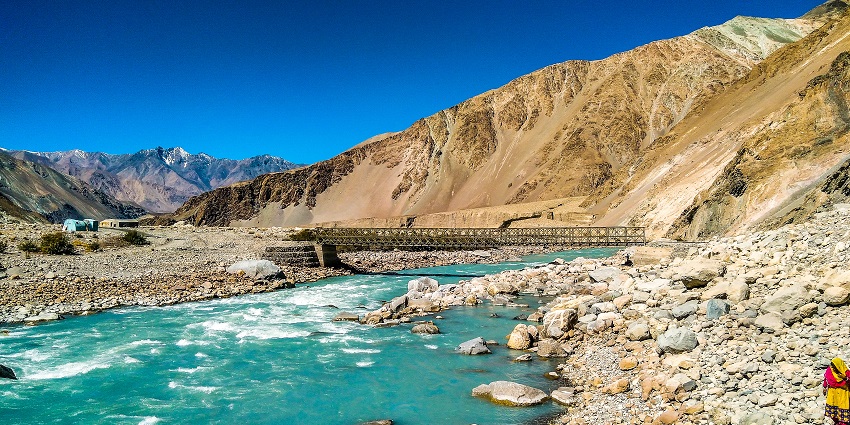
Photo: Eatcha / Wikimedia Commons / Image For Representation Only
Phugtal Monastery is situated in Lungnak Valley which is in the Zanskar region, one of the many valleys of southeastern Ladakh, India. It is one of the most beautiful and remote monasteries in the world, as it is located high atop a cliff above the Tsarap River. The monastery is constructed around a natural cavern which is believed to have welcomed saints and looking monks more than two thousand years ago. The only way to get to it is to hike about, a few hours from the nearest road at Purne, which is also reached from Padum.
Suggested Read: Top Things To Do In Leh To Seek Adventure And Beauty
How To Reach
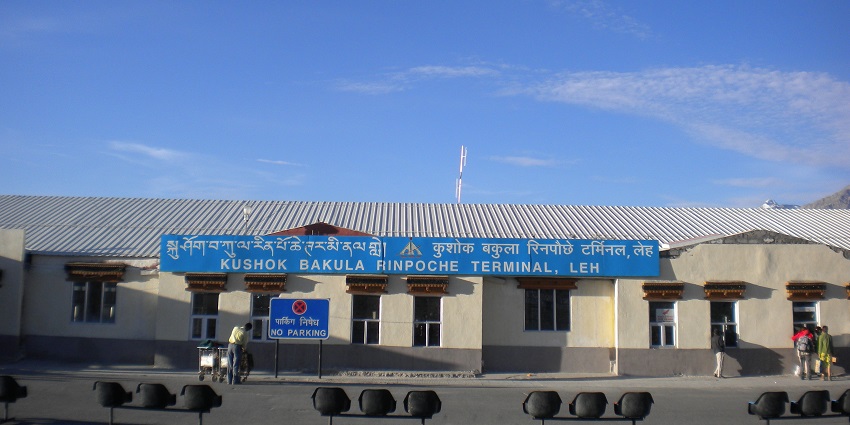
Photo: Saippuakauppias / Wikimedia Commons
By Air: Fly to Kushok Bakula Rimpochee Airport in Leh, which is easily reachable from many important Indian cities including Delhi, and Srinagar.
By Road: Leh is accessible by Manali-Leh highway or Srinagar-Leh. Both these routes are picturesque yet challenging.
Trekking Duration: The trek from Purne to Phugtal takes 4-5 hours and covers approximately 7 kilometres.
Places To Visit Around The Phugtal Monastery
1. Purne Village
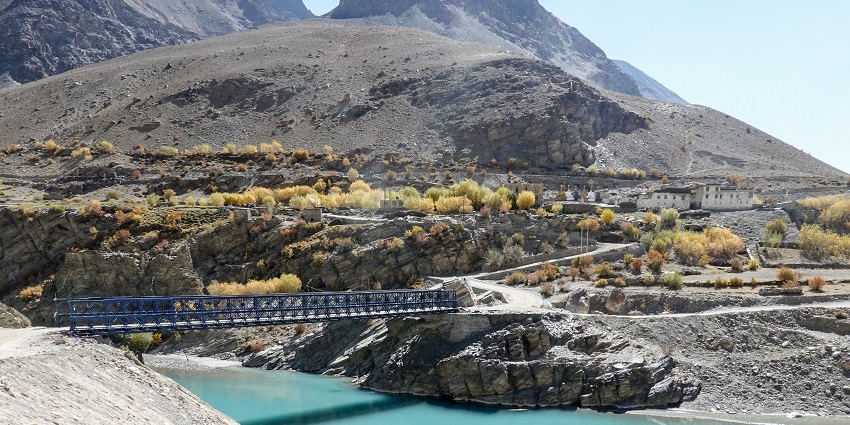
Photo: Timothy A. Gonsalves / Wikimedia Commons
Situated approximately 7 kilometres away from the monastery, Purne Village is the primary centre for the trekkers visiting the monastery. It is geographically positioned on the banks of the Lungnak River in the region of Zanskar, serving as the very last motorable point for those embarking on the Phugtal trek. Basic shelter can be found in this village, which serves as a very effective and convenient stop for anyone planning to visit the monastery. Purne has magnificent mountain scenery and the place where the two rivers, Kurgiak and Tsarap, meet which makes it very beautiful.
Distance From The Phugtal Monastery: 7 km
Best Time To Visit: May to September
Suggested Read: Top Places To Visit In Nubra Valley
2. Cha Village
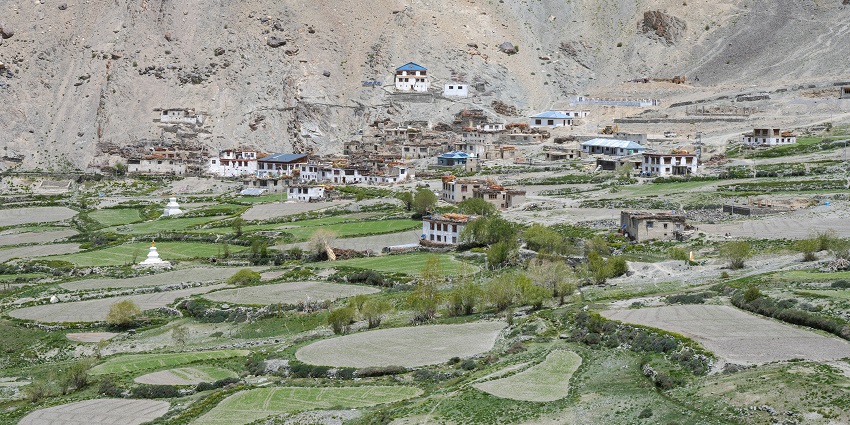
Photo: Timothy A. Gonsalves / Wikimedia Commons
Cha Village is a quaint little village located in Ladakh’s Zanskar region. Set against a rugged backdrop in the Himalayas, Cha provides one with the beauty and charm of the rustic Zanskari society. The incoming trekkers bound to Phugtal village, tend to halt here owing to the trekking route along the natural beauty of the place and the cultural exuberance that it promises. With high peaks all around and green fields in the summer and stunning scenery of distant Zanskar Valley, Cha is breathtaking. The village houses a few Tibetan Buddhists, and one can observe their incisive lifestyle very closely as most of them practise farming.
Distance From The Phugtal Monastery: 12 km
Best Time To Visit: May to September
3. Anmo Village
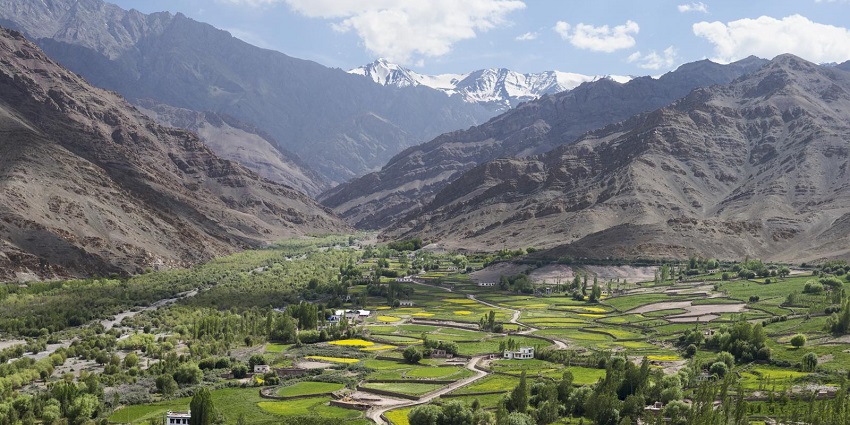
Photo: Christopher Michel / Wikimedia Commons / Image For Representation Only
Anmo Village is located approximately 10 kilometres away from the monastery in Zanskar Valley, Ladakh, and is situated in a beautiful valley. This beautiful village presents an insight to the people of Zanskar and their style of living. Its mud houses and quiet environment add to its charm. The village also offers splendid views of the mountains in the vicinity and the calm Tsarap River. Anmo is considered as one of the best halts for the trekkers travelling to Phugtal. It is the resting place in the lap of nature.
Distance From The Phugtal Monastery: 12 km
Best Time To Visit: May to September
Suggested Read: Places To Visit In Leh For A Refreshing Retreat In Nature’s Lap
4. Bardan Monastery
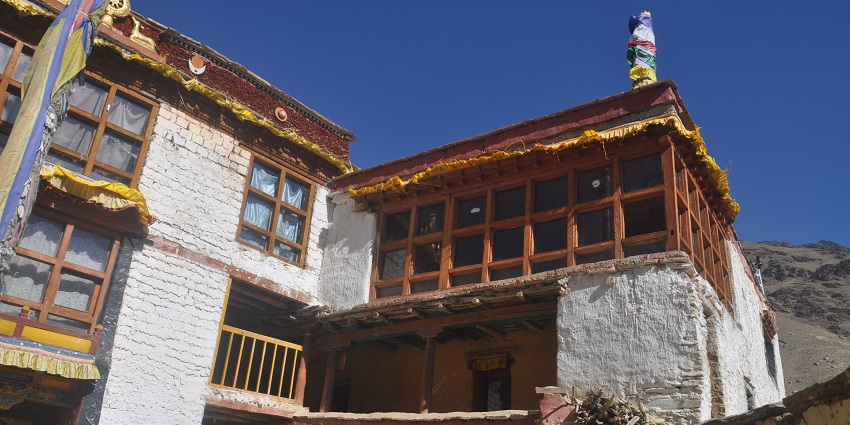
Photo: Prof Ranga Sai / Wikimedia Commons
Established in the 1600s, the Bardan Monastery is affiliated to the Gelugpa form of Tibetan Buddhism and has traditional designs with decorated paintings and a shrine. A small contingent of priests lives inside the monastery and practises meditation and other ceremonies. Amongst the large prayer wheels, and historical preserved items, the other highlights are fewer. Bardan is situated in amazing sceneries and hence provides the tourists a peaceful place where they can experience Zanskari culture and religion.
Distance From The Phugtal Monastery: 45 km
Best Time To Visit: May to September
5. Padum
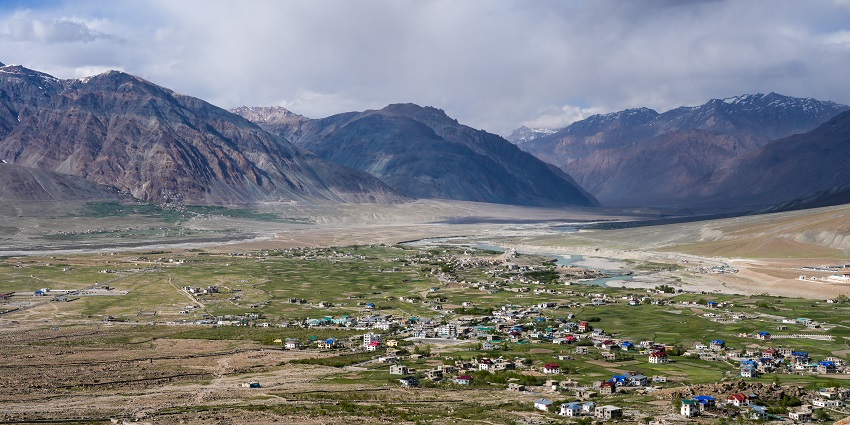
Photo: Timothy A. Gonsalves / Wikimedia Commons
With its strategic location to the monastery about 45 kilometres away, Padum is the biggest town in the Zanskar Valley, which also acts as an important gate for passing visitors into the region’s territorial boundaries. This delightful little town is beautiful and culturally rich, with its alluring mountains and peaceful landscape. Padum boasts a lively local market attractive to visitors interested in the Zanskari way of life and buying handicrafts. Among the interesting places, the ancient Karsha Monastery, decorated with beautiful murals and prayer halls, and Sani Monastery, which is famous for its distinctive style of architecture, are found.
Distance From The Phugtal Monastery: 45 km
Best Time To Visit: May to September
Suggested Read: Places To Visit In Ladakh
Where To Stay
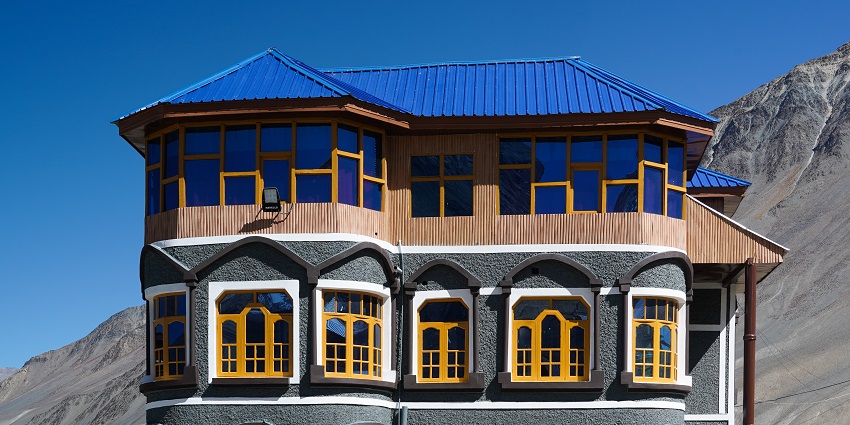
Photo: Timothy A. Gonsalves / Wikimedia Commons
There are a couple of guesthouses and home stay facilities in the adjoining Padum and Purne villages. Padum houses Zanskar Hotel and of course, other local homestay places where customers are able to experience firsthand Zanskari way of life. The majority of these lodges or hotels however, will provide the minimum level of comfort for both the trekkers and the travellers in terms of food and lodging.
Where To Eat
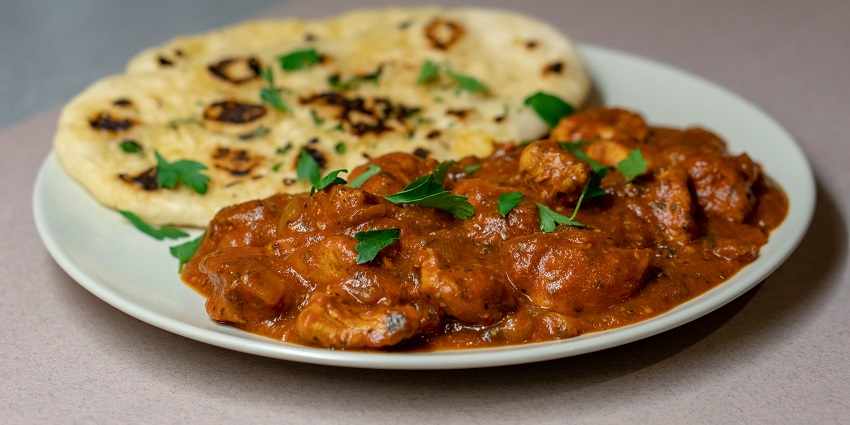
Photo: amirali mirhashemian / Wikimedia Commons / Image For Representation Only
Away from the popular tourist centre of monastery, the only dining experience can be found in local dhabas and guesthouses serving Zanskar’s traditional fare. Further on from that, In Padum, restaurants such as the Zanskar Kitchen and several small eateries with simple dishes consisting of rice, dal, and local greens. In the tea houses along the trekking trails, they also have snacks and teas for the visitors taking in the views and enjoying the local delicacies.
Suggested Read: Places To Visit Near Leh Ladakh That Will Drop Your Jaw
Best Time To Visit
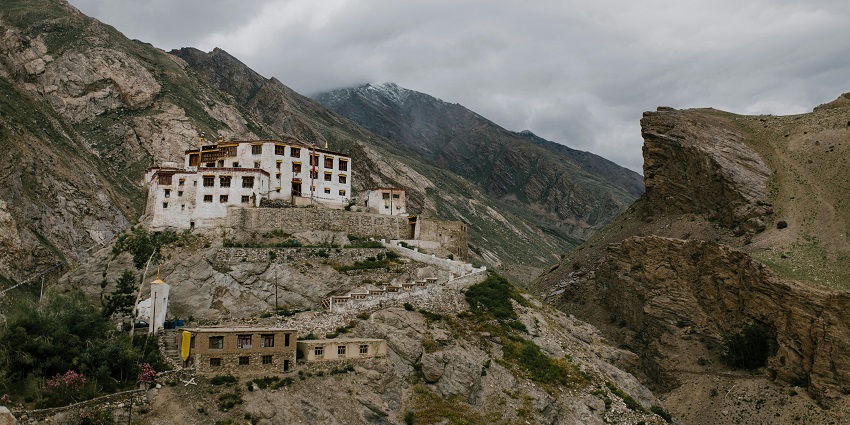
If you are looking for the most appropriate time to visit the monastery, we highly recommend going between May and September during the summer season when the weather is bearable, and the trekking trails are open to the visitors. This time presents clear sunshine and beautiful sceneries making it perfect for walking and touring around the monastery.
Other Factors To Consider

Photo: Anete Lūsiņa / Unsplash / Image For Representation Only
Average Cost Of The Trip
Hiring a local guide for the trek to the monastery typically ranges from ₹500 to ₹1,000 per day. Options for staying near Phugtal include guesthouses and homestays in Padum or Purne, with rates generally ranging from ₹1,000 to ₹3,000 per night, depending on amenities. Meals in local eateries around Padum and Purne usually cost between ₹300 and ₹700, varying based on the type of cuisine and restaurant ambiance.
Tips For Travellers
- Carry sufficient cash with you
- Travel light while trekking- carry sun protection, water, etc.
- Check the weather before travelling to locations.
Suggested Read: Top Places To Visit In Kargil To Explore History And Unveil Adventure
The Phugtal Monastery and its surrounding areas offer a treasure trove of experiences for every kind of traveller. From exploring the monastery and engaging in spiritual experiences to visiting various villages, this destination has it all. As you plan your next trip to Ladakh, let TripXL shoulder the burden of bookings and best deals.
Cover Photo: Timothy A. Gonsalves. / Unsplash / Image For Representation Only


 WhatsApp
WhatsApp
 Twitter
Twitter









